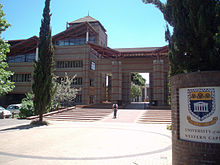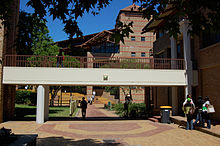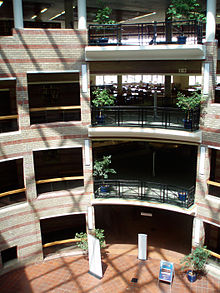- University of the Western Cape
-
University of the Western Cape 
Motto Respice Prospice Established 1959 Type Public university Chancellor Desmond Tutu Vice-Chancellor Brian O’Connell Students 15,226 Undergraduates 11,836 Postgraduates 3,390 Location Modderdam Road, Bellville, Cape Town, Western Cape, South Africa Campus Urban setting Affiliations ACU, CHEC, HESA, IAU Website http://www.uwc.ac.za/ The University of the Western Cape is a public university located in the Bellville suburb of Cape Town, South Africa. It was established in 1960 by the South African government as a university for Coloured people only. Other universities near Cape Town are the University of Cape Town, (UCT, originally for English speaking whites) and the Stellenbosch University (originally for Afrikaans speaking whites). The establishing of UWC was a direct effect of the Separate University Education Bill of 1957. This law accomplished the segregation of higher education in South Africa. Coloured students were only allowed at a few non-white universities. In this period, other 'ethnical' universities, such as the University of Zululand and the University of the North, were founded as well. Since well before the end of apartheid in South Africa in 1994, it has been an integrated and multiracial institution.
Contents
History
Early days
UWC started as a 'bush college', a university college without autonomy under auspices of the University of South Africa. The university offered a limited training for lower to middle level positions in schools and civil service. In the first years of its existence, a great deal of the teaching staff was white. Many of the lecturers came from the University of Stellenbosch. The language in most lectures was Afrikaans. The first rector was N.J. Sieberhagen (from 1960 till 1973). The university started as a small institution: in the first year, 166 students were enrolled and the teaching staff numbered 17. In 1970, the institution gained university status and was able to award its own degrees and diplomas.
Resistance against Apartheid
During the first 15 years, the board and staff were primarily whites, supporting the National Party and apartheid. One of the few exceptions was Adam Small, head of the Philosophy Department. Small was dismissed in 1973 as a consequence of his involvement in the Black Consciousness Movement. Apart from lecturers like Small, there were many students who were active in the struggle against apartheid, and who were loyal to the Black Consciousness Movement. Protests from students against the conservative university board and lack of participation in the university led to the appointment of the first coloured rector, Richard E. van der Ross in 1975. The years thereafter gave way to a more liberal atmosphere, in which the university gradually distanced itself from apartheid. In 1982, the university rejected the apartheid ideology formally in its mission statement; during the next year, the university gained the same autonomy as white universities through the University of the Western Cape Act.
Rector Jakes Gerwel made UWC an "intellectual home of the left", with attention for social and political issues. The university attracted increasing numbers of students from disadvantaged communities. Apart from coloured people, more and more black students enrolled. Gerwel was succeeded in 1995 by Cecil Abrahams, who was succeeded by Brian O'Connell in 2001. UWC retained the status of an autonomous university during the education restructuring of 2002.
During the past decade, UWC has developed an international reputation for research and development of free/open source software solutions and open educational resources. UWC is the only African institution that is a member of the Open Courseware Consortium, and was voted onto the OCWC board in 2007.
Today
Since then, The University of The Western Cape has grown to become one of the most diverse universities in South Africa. Its excellence and quality of education is complemented by its faculty and staff, and brought to life by its students.
Ranking
See also: Rankings of universities in South Africa and Rankings of business schools in South AfricaIn 2010 Webometrics ranked the university the 7th best in South Africa and 1032th in the world.[1]
Children's Rights Project
The Children's Rights Project is a South African organization. Located in the Community Law Centre, University of the Western Cape. Its goal is the recognition and protection of children's rights within the framework of the United Nations Convention on the Rights of the Child, the African Charter on the Rights and Welfare of the Child and the Constitution of the Republic of South Africa.
Notable alumni
- José Luís Guterres, East Timorese politician and diplomat
- Zoe Wicomb, author, both attended and taught at UWC.
- Danny Jordaan, Chief Executive Officer of the 2010 FIFA World Cup South Africa.
References / External links
- Official website of the University of the Western Cape
- Du Pré, R.H. (1996) Historical positioning. In: Thomas, Cornelis C. (1997) Wakker wakker en aan the brand; Waarneminge van a studente-aktivis, UWK 1976. Mayibuye History and Literature Series No.75.
- Free Courseware Project at the University of the Western Cape
- Southern African University
- ^ "Top Africa". Ranking Web of World Universities. http://www.webometrics.info/top100_continent.asp?cont=africa. Retrieved 26 February 2010.
University of the Western Cape People Academics South African universities 
Traditional universities Cape Town · Fort Hare · Free State · KwaZulu-Natal · Limpopo · Monash · North-West · Pretoria · Rhodes · Stellenbosch · Western Cape · Witwatersrand
Comprehensive universities Universities of technology Related  Category ·
Category ·  List
ListVarsity Cup Teams Varsity Shield Teams Varsity Cup Seasons 2008 • 2009 • 2010 • 2011 • 2012Categories:- Universities in the Western Cape
- Education in Cape Town
- Public universities in South Africa
- Educational institutions established in 1959
- Association of Commonwealth Universities
- University of the Western Cape
Wikimedia Foundation. 2010.



